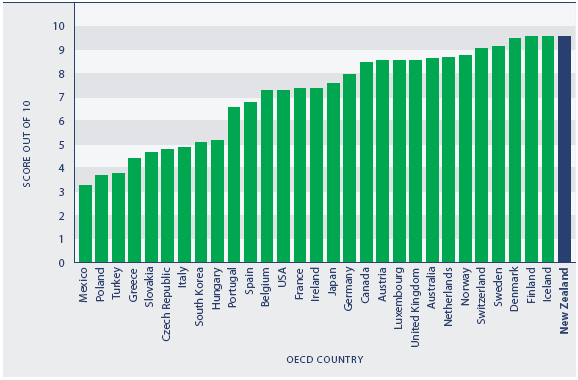Perceived corruption
Definition
The perceived level of corruption – defined as "the abuse of public office for private gain" – among New Zealand politicians and public officials, on a scale of 0 (highly corrupt) to 10 (highly clean).
A country’s score in the Corruption Perceptions Index is derived by Transparency International from a number of different surveys of business people and country analysts.
Relevance
Corruption undermines democracy and the rule of law and threatens domestic and international security. Corruption also has adverse social and economic consequences for a country. The Corruption Perceptions Index is a good proxy indicator of the values and norms that underpin public institutions.
Current level and trends
New Zealand's score in the Corruption Perceptions Index 2006 was 9.6, the same score as in 2004 and 2005. Since the index was first developed in 1995, New Zealand has consistently scored well, with more than 9 out of a possible 10 in each period reported.
International comparison
In the Corruption Perceptions Index 2006, New Zealand was ranked first equal with Finland and Iceland as the least corrupt nations in the OECD. Since 1995, New Zealand has consistently been among the top four OECD nations perceived as highly clean.
New Zealand scored higher in the perceived corruption index than Australia (eighth equal, 8.7), the United Kingdom (10th equal, 8.6), Canada (13th, 8.5) and the United States (18th equal, 7.3).
Figure CP4.1 Corruption Perceptions Index scores (0=highly corrupt, 10=highly clean), OECD countries, 2006

Source: Transparency International (2006)
|

